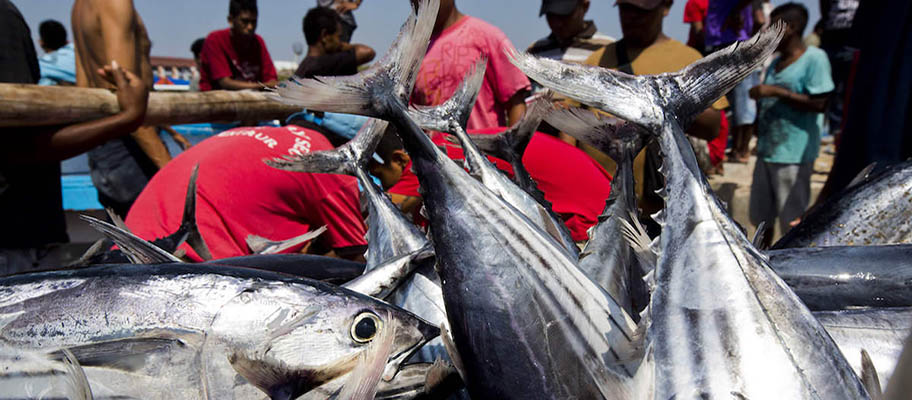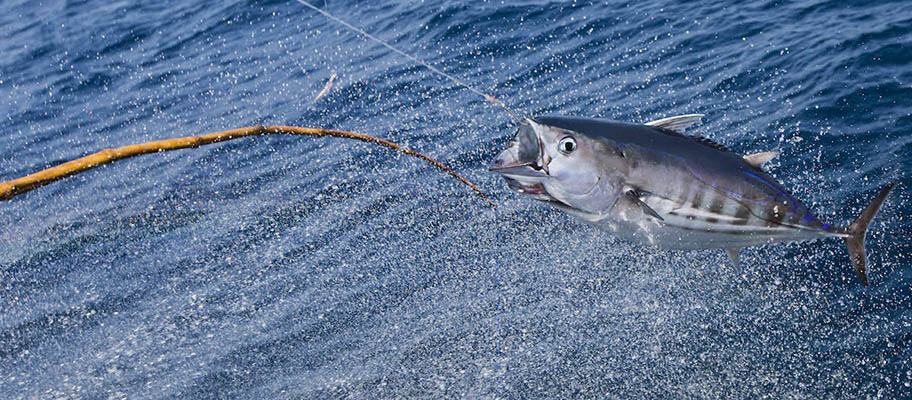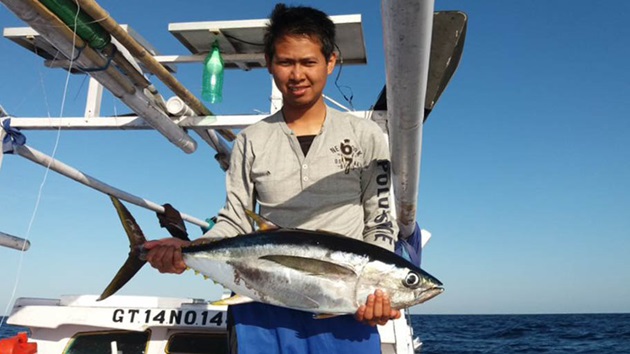Eight small-scale tuna fisheries with over 380 vessels scattered throughout the Indonesian archipelago have been certified to the MSC Standard, adding over 11,000 tonnes of sustainable tuna to U.S and European markets.
 © AP2HI (Asosiasi Perikanan Pole and Line dan Hand Line Indonesia) and IPNLF (International Pole and Line Foundation)
© AP2HI (Asosiasi Perikanan Pole and Line dan Hand Line Indonesia) and IPNLF (International Pole and Line Foundation)
The Indonesia pole-and-line and handline, skipjack and yellowfin tuna of Western and Central Pacific archipelagic waters has been certified as sustainable to the MSC Fisheries Standard.
This represents the third tuna fishery in the country in just over three years to achieve sustainable status. To be certified, a fishery must show the stock it catches is healthy, that it minimises its impact on the environment and has effective management in place.
Eight fisheries with over 380 vessels from North Sulawesi and North Maluku to the Banda Sea and East and West Flores are part of the certificate.
Around 60% of the total 11,00 tonnes caught by the certificate holders is yellowfin tuna, distributed as loin, poke (pronounced poh-keh) and saku. The certified skipjack tuna will be sold as frozen product to export markets in the U.S and U.K.
The fishery is managed by the Indonesia Pole and Line and Handline Tuna Fisheries Association (AP2HI) and the International Pole and Line Foundation (IPNLF) who have implemented a fishery improvement project since 2014. The fishery has also in part, been supported through the MSC’s Fish for Good project.
Asia Pacific Director at the Marine Stewardship Council, Patrick Caleo, stated: “We extend our congratulations to AP2HI for their hard work and success in progressing another tuna fishery to achieve MSC certification. Managing various fisheries with different specifications for assessment needs a rigorous strategy and clear implementation.”
Independent assessors, Global Trust Certification, determined the fishery should be certified following detailed assessments and stakeholder consultations with the Western and Central Pacific Fisheries Commission (WCPFC) – the regional body responsible for 60% of the world’s tuna catch. National and provincial government were also consulted.
The fisheries have eight goals they must meet within five years to retain the certificate, related to harvest strategies and stock management.
 © AP2HI (Asosiasi Perikanan Pole and Line dan Hand Line Indonesia) and IPNLF (International Pole and Line Foundation)
© AP2HI (Asosiasi Perikanan Pole and Line dan Hand Line Indonesia) and IPNLF (International Pole and Line Foundation)
In 2019, a memorandum of understanding (MoU) was signed between the MSC and the Ministry of Marine Affairs and Fisheries , detailing a joint commitment to strengthening collaboration on sustainable fishing. In May 2020, the North Buru and Maluku Fair Trade Fishing Associations, Indonesia Handline Yellowfin tuna was certified to the MSC Standard, echoing the success of the collaboration.
Interim Director General of Capture Fisheries, the Indonesian Ministry of Marine Affairs and Fisheries, Ir. Muhammad Zaini, M.M. said: “Again, we have successfully shown the world our commitment towards sustainable tuna fishing in Indonesia.
“As one of the largest tuna producers in the world, it is vital we enable the certification journey through a fisheries improvement project in order to sustainably grow while remaining viable for future livelihoods. Support from stakeholders to our small-scale tuna fisheries which help accelerate progress towards sustainability is pivotal to this goal. Indonesia is proud to have our third tuna fishery meet the highest global fisheries sustainability standard.”
Head of the Pole & Line and Handline Fishery Association (AP2HI), Janti Djuari said: “Working together towards sustainable fisheries has been our commitment since 2012. Even though 2020 was coloured by pandemic impacting the tuna business in Indonesia, this certification is a new start. We are confident that this certification will encourage our members in the association to develop a more sustainable and traceable fishing practice.”
 © AP2HI (Asosiasi Perikanan Pole and Line dan Hand Line Indonesia) and IPNLF (International Pole and Line Foundation)
© AP2HI (Asosiasi Perikanan Pole and Line dan Hand Line Indonesia) and IPNLF (International Pole and Line Foundation)
The IPNLF is a recipient of the MSC’s Ocean Stewardship Fund, receiving £100,000 in 2020 to progress tuna associations in Indonesia and their associated supply chain to the MSC Standards.
Director of IPNLF Southeast Asia, Jeremy Crawford, said: “We are pleased to be part of this important process of building value in the local one-by-one tuna supply chains. Together with our local partners, and with the support of the Indonesian Ministry of Marine Affairs and Fisheries (MMAF), IPNLF has been able to realise significant improvements in fishery operations, governance, and in securing livelihoods.
“Members of IPNLF and supply chain partners, such as AP2HI, play an important role to secure the sustainability pillars – environmental, social and economic benefits – which is our first priority. This is the only way to ensure that vulnerable communities are securing access to food security and economic well-being for the long term.”
Alongside Fish for Good, in 2018, the MSC’s Student Scholarship Grant supported Indonesian fisheries science research to improve the use of fish aggregating devices (FADs).
Postgraduate research scientist, Ahmad Catur Widyatmoko, completed his master’s research with the University of Basque, Spain in 2018. Ahmad worked with fisheries and local NGO partners to map the use of anchored FADs in Indonesian waters to help prevent overfishing.

